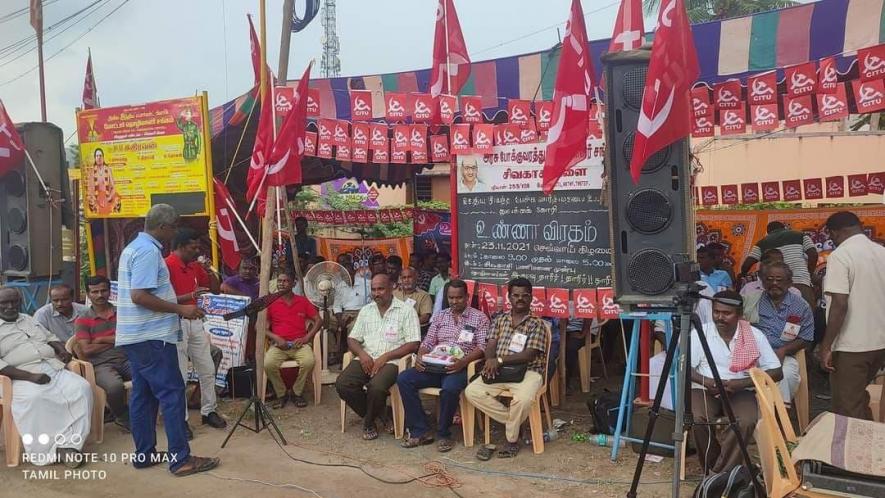TN: Dismayed Transport Workers to Intensify Protest Seeking Wage Talks

Transport workers on hunger strike in front of the Sivakasi TNSTC depot (Courtesy: Tamil Selvan, CITU).
The workers of the Tamil Nadu State Transport Corporation (TNSTC) are planning to intensify their agitation as the 14th wage revision talks remain a non-starter. The decision was taken in the state council meeting of the TNSTC Workers’ Federation affiliated to the Centre of Indian Trade Unions (CITU).
Earlier on November 22 and 23, the workers affiliated to the CITU held hunger strikes across the state reiterating their demands.
The wage settlement talks remain a non-starter, even after the Dravida Munnetra Kazhagam (DMK) government assumed office seven months ago. The 13th wage settlement expired two years ago.
The other major demands of the workers include pending 'bhaata' to the tune of Rs 27 crores, non-payment of the workers’ contribution towards employees' state insurance (ESI) and Life Insurance Corporation (LIC) premium of about Rs 10,000 crores and restoration of the old pension scheme. The DMK had promised to settle the demands in the election manifesto.
The CITU has also opposed the increase in life time of the buses from seven lakh kms or six years to 12 lakh kms or 12 years. The workers cite lack of maintenance, unavailability of spare parts and depreciation as the reasons along with the safety of the passengers and staff.
GOVT INSENSITIVE TO DEMANDS
The workers of all the trade unions in the TNSTC have been holding protests against the delay in the wage settlement talks since the last two years. The previous All India Anna Dravida Munnetra Kazhagam (AIADMK) shied away from engaging in talks with the trade unions, which is replicated by the DMK government as well.
A Soundarajan, president of the TNSTC Workers Federation (CITU), accused the DMK government of remaining insensitive to the demands of the workers even after seven months in office.
Referring to the poll promise of the DMK on ensuring the efficient operation of the transport corporation and settling the wage revision talks of the workers, Soundarajan said, “The 13th wage settlement expired in September 2019. The workers have been continuously demanding to hold talks, which has been turned down by the successive governments.”
The CITU affiliated union of TNSTC workers held a hunger strike on November 22 and 23 in depots across the state demanding the government to initiate the wage revision talks, but the response of the government is muted.
“The workers are severely stressed and angry over the response of the government. We are contemplating intensifying the struggles in the upcoming months to win the rights of the workers,” Soundarajan said.
‘TO INTENSIFY THE PROTESTS’
After the 13th wage settlement expired in September 2019, the 17 trade unions in the state transport corporation pressed the then AIADMK government to start the talks immediately. Subsequently the government cited the pandemic and the losses incurred by the TNSTC and the State Express Transport Corporation (SETC) as the reason for the delay in talks.
The workers held massive protests in February 2020 and January 2021 to pursue the government to initiate talks. The workers have been demanding salaries on par with state government employees.
The Labour Progressive Federation (LPF), the trade union of the DMK, was in the forefront of the protests, but has taken a back seat now. The Anna Thozhilalar Peravei (ATP) of the AIADMK and the right-wing Bharatiya Mazdoor Sangh (BMS), which were silent during the previous regime, have become vocal.
However, the CITU has continued to raise its voice for the workers by organising continuous protests. The AIADMK government remained non-committal while the CITU accused the DMK government of following suit.
“Citing losses is not at all a reason for not initiating the talks. The difference between the income and the expenses of the corporation for implementing the welfare measures, including free travel for school, college students and women have not been paid by the government to the corporation,” said C Suresh Kumar, joint secretary of the Nagercoil region of the union.
WORKERS OPPOSE NEW REGULATIONS
In another unexpected move, the government issued an order extending the lifetime of the state-run buses. The new order mandates the buses to be operated for nine years or 12 lakh kms from the existing six years or seven lakh kms. The government has cited technological improvements of the buses and the improved road conditions as reasons behind the change.
The workers disagree with the order and point to the existing condition of buses, roads and lack of maintenance, and even spare parts.
“The condition of the roads is good only in urban areas, while in rural and semi-urban regions, the conditions are pathetic. The buses wear out quickly and there are no sufficient tyres and spare parts in many depots,” Suresh said.
The CITU also dismissed the claims of improved bus quality and referred to passengers holding on to umbrellas and staff operating with raincoats during monsoons as an example of ground reality.
The workers also demand the restoration of the old pension scheme and timely disbursal of retirement benefits, increase in the fleet of buses and proportional appointments.
Get the latest reports & analysis with people's perspective on Protests, movements & deep analytical videos, discussions of the current affairs in your Telegram app. Subscribe to NewsClick's Telegram channel & get Real-Time updates on stories, as they get published on our website.























